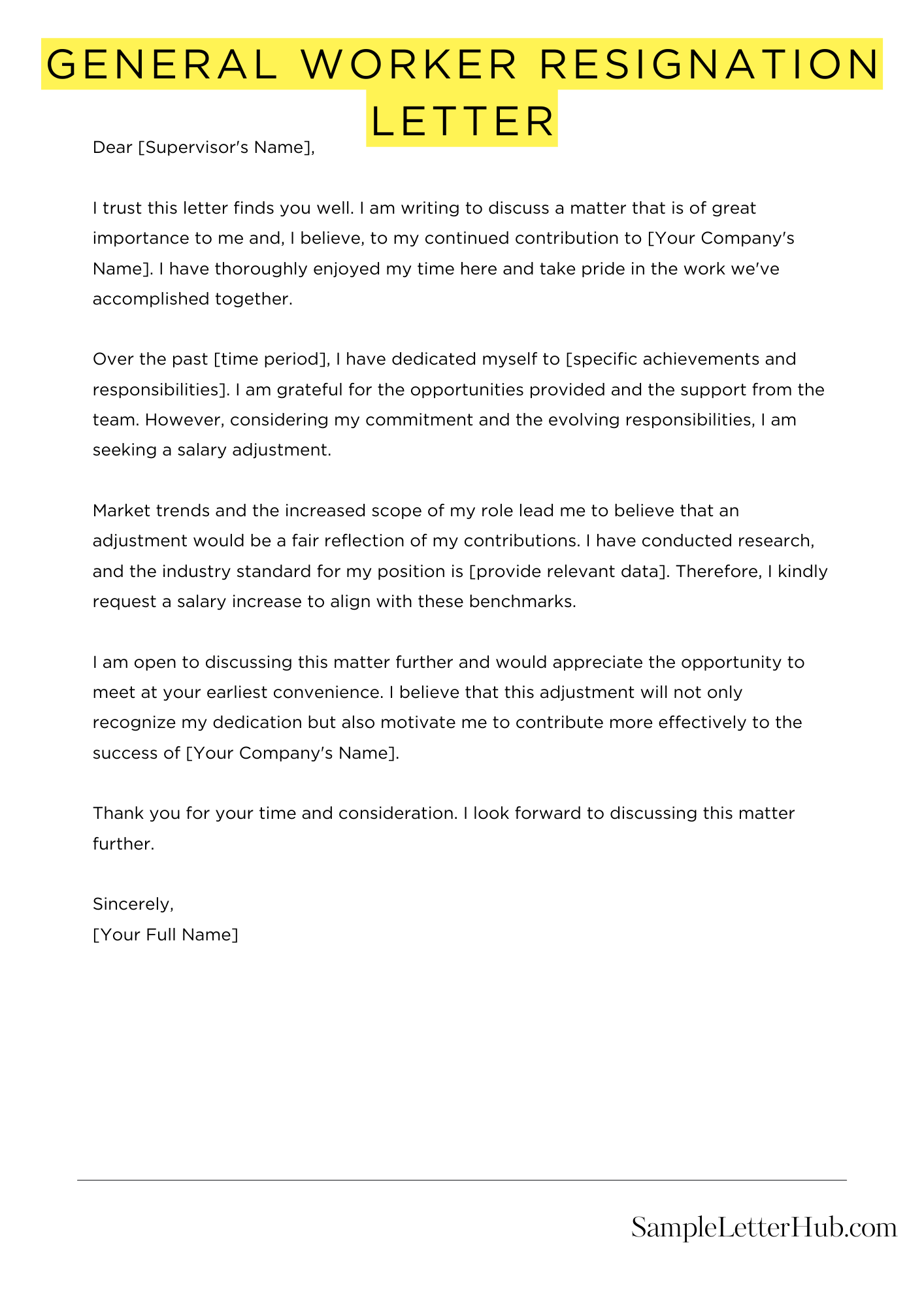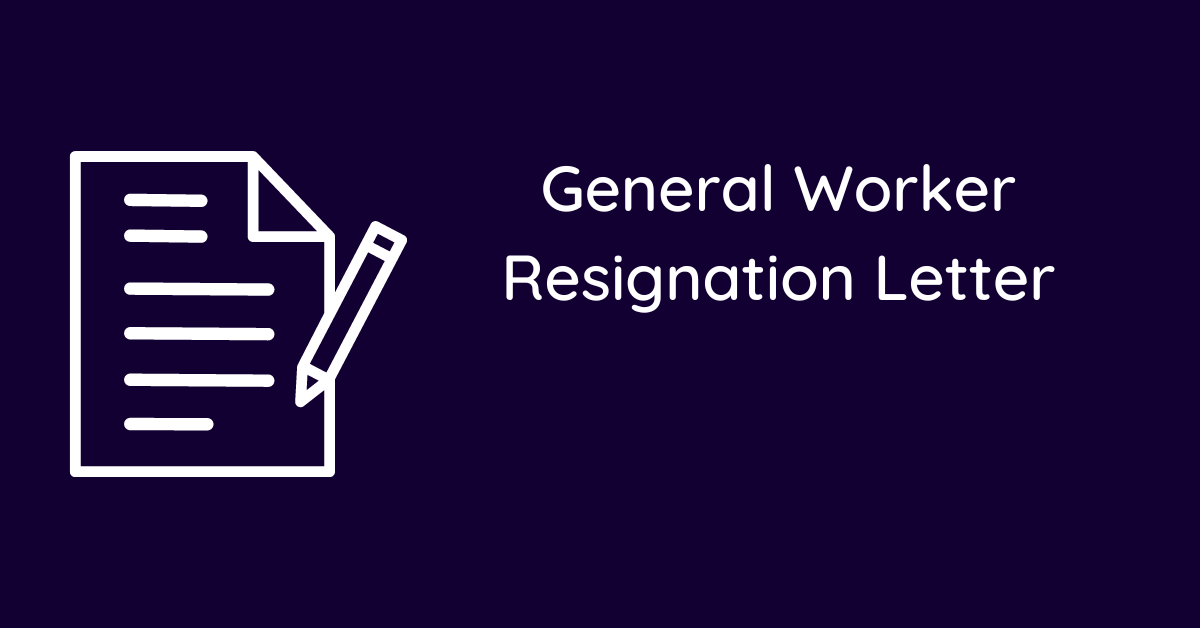If you’re preparing to leave your current role, a well-crafted general worker resignation letter is essential. In this article, we’ll provide you with a sample letter that you can adapt to your specific situation.
When writing your resignation letter, it’s important to strike the right tone. Be polite and humble, expressing your gratitude for the opportunity to work at the company. Clearly state your decision to resign, along with your last date of employment. Keep your letter brief and to the point, focusing on the essential details.
Below, you’ll find a template for a general worker resignation letter that you can use as a starting point. Feel free to customize it to reflect your individual circumstances and the company’s specific requirements.
General Worker Resignation Letter
Dear [Manager’s Name],
I am writing to inform you of my decision to resign from my position as a General Worker at [Company Name], effective two weeks from today, [Last Date of Employment].
I have enjoyed my time at [Company Name] and appreciate the opportunities I have been given. I am grateful for the support and guidance I have received from my colleagues and supervisors.
I wish you and [Company Name] all the best in the future.
Sincerely,
[Your Signature]
Short General Worker Resignation Letter Sample
Please accept this letter as formal notification that I am resigning from my position as General Worker at [Company Name]. My last day of employment will be [Your Last Day]. Thank you for the opportunity to grow and learn during my time here. I wish you and the company continued success. I am happy to assist in the transition process to ensure a smooth handover of my responsibilities.
I wish you all the best with your general worker resignation letter.
When it’s time to say farewell, expressing your gratitude and best wishes can make the transition smoother:

How to Write a General Worker Resignation Letter
1. Start with a Formal Salutation
Begin your letter with a formal salutation, such as “Dear [Manager’s Name].” This shows respect and professionalism.
2. State Your Intention to Resign
Clearly state your intention to resign from your position. Use a phrase like, “I am writing to inform you of my decision to resign from my position as [Your Position] at [Company Name].”
3. Provide Your Last Date of Employment
Indicate your last date of employment. This is important for the company to plan for your departure. For example, “My last day of employment will be [Your Last Date].”
4. Express Gratitude
Take this opportunity to express your gratitude for the opportunity to work at the company. Mention any specific experiences or individuals that have made your time there valuable.
5. Offer to Assist with the Transition
Let the company know that you are willing to help with the transition during your notice period. This shows that you are committed to leaving on good terms. For example, “I am happy to assist in any way possible to ensure a smooth transition during my notice period.
6 Most Frequently Asked Questions About General Worker Resignation Letters
Resigning from a job can be a daunting task, and writing a general worker resignation letter can be even more challenging. Here are the six most frequently asked questions about general worker resignation letters, along with their answers:
1. What should I include in my resignation letter?
Your resignation letter should include your name, address, date, the company name, the company address, a salutation, a statement of resignation, your last date of employment, and your signature. You may also include a brief statement of gratitude or appreciation for the opportunity to work at the company.
2. How long should my resignation letter be?
Your resignation letter should be brief and to the point. It should be no more than a few paragraphs long.
3. What tone should I use in my resignation letter?
Your resignation letter should be professional and respectful. It should be written in a positive and upbeat tone.
4. Do I need to give two weeks’ notice?
In most cases, it is considered good practice to give two weeks’ notice when resigning from a job. However, this may not always be possible, depending on your circumstances. If you are unable to give two weeks’ notice, you should still give as much notice as possible.
5. What should I do if I am asked to leave immediately?
If you are asked to leave immediately, you should remain professional and cooperative. You should offer to help with the transition in any way that you can.
6. What if I have any questions about my resignation?
If you have any questions about your resignation, you should speak to your supervisor or human resources department. They will be able to provide you with the information that you need.
Before making the decision to resign from your job, it’s essential to consider the legal aspects:
Understanding your emotions after quitting your job is important. Explore why you might be feeling sad:
Related
- Resignation letter sample
- Forced resignation letter
- Resignation letter due to going abroad
- Resignation letter due to marriage
- Resignation letter due to other opportunity
- Resignation letter due to mistake

